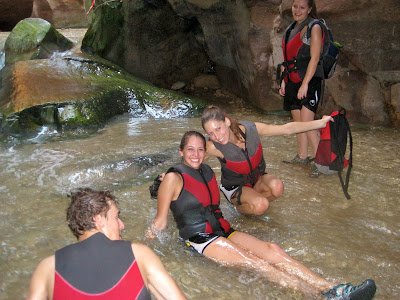Almost a week down and the reality of my being here and the fact that I’m going to be living in the Middle East for the next four months is finally starting to set in. There are seventeen of us American students on the program and we’ll be taking Arabic and Middle Eastern Studies classes at Amideast’s facilities in West Amman (the nicer, more westernized side of the city). We’ve all been staying at a hotel near Amideast until we move-in to our various accommodations for the semester – apartments for some of us and host Jordanian families for others.
I’m living in an apartment with two other American students (both from New York so we’ll undoubtedly be having an ongoing WestCoast/East Coast debates..)
The week has been a whirlwind of jet-lag and adjusting to the dry heat and hearing Arabic spoken everywhere and learning to BREATH amidst the hazardous concoction of high altitude, car exhaust fumes, cigarette smoke, shisha smoke, cigar smoke, smoke…
 |
| Amideast 2012 |
Having traveled to many places in my life I can say with absolute certainty that I have never been to a place like Amman. The city is the chaotic, loud, dusty result of overlapping forces – you have ancient ruins like the Roman amptheatre and the surreal crumbling pillars of the Citadel alongside distinctly Arab stone houses cascading down the hills into the distance. There are the distinct signs of globalization infiltrating the traditional society (McDonalds, Starbucks, Popeyes) next to cafes overflowing with bearded men and hijab-wearing woman sipping coffee and smoking Hookah. Sometimes I feel like I could be walking down the street in San Francisco (Rainbow Street is the hip, cultural epicenter of Amman and has lots of artsy stores and bookshops as well as a fat-free fro yo store and an independent movie theatre) and other times I feel completely out of place in a strange and foreign world. Some observations I’ve made so far are:
- Far from a Mubarak or Gaddafi character, Jordanians LOVE their King…you can actually be arrested for slandering King Abdullah’s name. It’s the Parliament and the prime minister that many Jordanians blame for high inflation and unemployment alongside the high cost of living here. When it comes to the royal family though – celebrity status – you can’t really go anywhere without Abdullah’s grinning picture present.
-Jordan can be confusing because on the one hand it can seem very modern – most all young people speak English perfectly and you can get pretty much any food from sushi to Chinese take-out to nice oven-baked Italian pizza – but then you can’t forget the conservative bedrock of society. It took us thirty minutes and lots of failed attempts walking into restaurants and checking menus before we could find a single place that served alcohol around our hotel!
-Arab time is a real thing….let’s meet up at 8 can turn into 9 can turn into 10…promptness is definitely not valued like in the U.S
-I would NOT get behind the wheel here – the city is organized in a linear progression of numbered circles (for ex. our apartment is near seventh circle and Rainbow street is by the first circle) and that’s basically how people orient. Rather than street names, people mostly give directions by describing nearby landmarks. The fast and reckless driving, especially around the roundabout circles, makes crossing the street, especially for somewhat of a space cadet like me, a bit of an issue. Also, on cars, CRAZY expensive here – apparently there’s a 100% sales tax.
-Jordanians are very centered around TRADITION and FAMILY, which our program diretor explains, is why the culture is having such a hard time grappling with the Arab Spring. They don’t take well to change and, as you can see by the construction going on almost everywhere, Amman is undergoing a lot of growth and progressive changes lately that are shaking up society a bit. I guess they only got their first McDonalds in 1996!







































